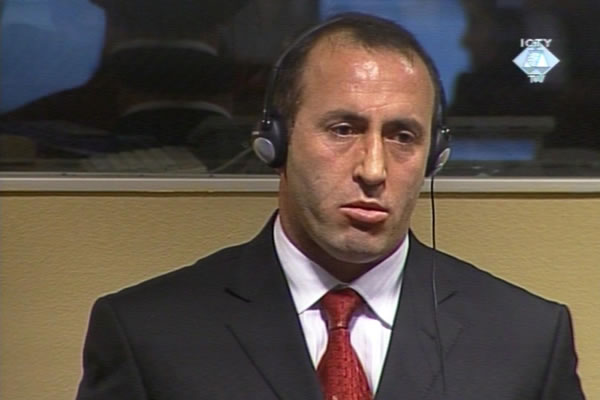Home
HARADINAJ AND BALAJ ACQUITTED, BRAHIMAJ GETS SIX YEARS
According to the Trial Chamber, the prosecution managed to prove that the KLA troops committed crimes – murder, cruel treatment, torture and rape – described in the eight counts of the indictment. However the involvement of the three accused was not proven beyond reasonable doubt, except in two cases. The judges ‘got a strong impression that the trial proceeded in an atmosphere in which the witnesses did not feel secure’
 Ramush Haradinaj hearing the judgment being read out
Ramush Haradinaj hearing the judgment being read out Ramush Haradinaj and Idriz Balaj were acquitted today on all counts in the indictment. The third accused Lahi Brahimaj was found guilty on two counts of cruel treatment and torture and was sentenced to six years in prison.
Three former KLA commanders were charged with participation in the ‘joint criminal enterprise’ aimed at establishing ‘complete control of the KLA over the Dukagjin operative zone’. The prosecution alleges that this was implemented by ‘attacks, persecution, and forceful elimination of Serbian civilians from this area’ as well as by ‘forcible prevention of any real or alleged collaboration of Albanian and Roma civilians with Serbs’. The total of 37 counts in the indictment charged the three accused with kidnapping, detention, beating, torture and killing of civilians qualified as crimes against humanity and violations of laws and customs of war.
The Trial Chamber with Dutch judge Orie presiding, Austrian judge Hoepfel and Judge Stole from Norway, first found that in the period covered by the indictment – 1 March to 30 September 1998 – the scale and frequency of the kidnappings, abuse and killings of civilians was not such to lead to the conclusion that there was a systematic and widespread attack against the civilian population, a prerequisite for the crime against humanity qualification.
[IMAGE]3325[/IMAGE]The Trial Chamber went on to conclude that the evidence presented by the prosecution was insufficient to lead to the conclusion that the joint criminal enterprise and the alleged joint criminal goal of the accused actually existed. It therefore found Haradinaj, Balaj and Brahimaj not guilty on this count.
The prosecution, as the Trial Chamber saw it, managed to prove that the KLA members committed crimes – killing, cruel treatment, torture and rape – described in eight counts in the indictment. However, the involvement and the responsibility of the accused were proved beyond reasonable doubt only in two cases. One was the cruel treatment and abuse of Kosovo Albanians who refused to join KLA and the other involved Kosovo Albanians held captive in the KLA camp in Jablanica under charges of collaboration with Serbian authorities. Accused Lahi Brahimaj, member of the KLA General Staff and commander of the Jablanica camp, personally participated in the abuse of the prisoners.
[IMAGE]3324[/IMAGE]Idriz Balaj was acquitted by a majority vote, with Austrian judge Hoepfel dissenting. In his view, there was enough evidence of Balaj’s responsibility for the aiding and abetting in the murder of a Kosovo Albanian woman whom he had forced to join the KLA.
This is more or less all that the Trial Chamber was able to conclude on the basis of the evidence called by the prosecution. As they delivered the judgment, the judges stressed the ‘significant difficulties’ with the witnesses in the course of the trial. Of a total of approximately 80 witnesses, 34 gave evidence with protective measures, the Chamber had to issue as many as 18 subpoenas compelling the witnesses to testify and several unwilling witnesses had to be arrested. As Judge Orie put it, the Trial Chamber ‘got a strong impression that the trial proceeded in an atmosphere in which the witnesses didn’t feel secure’. In addition to this, the security situation in Kosovo is ‘unstable’ and ‘unpleasant for the witnesses’. Paragraph 28 of the judgment notes that ‘difficulties concerning the gathering of evidence were a prominent feature of this trial’. Several witnesses ‘expected to give evidence on key aspects of the case’ failed to appear before the Tribunal.
The Office of the Prosecutor refrained from comments, apart from saying it intended to analyze the judgment in detail in the days to come and consider whether to appeal or not. According to OTP spokeswoman Olga Kavran, the chief prosecutor is especially concerned about the witness issue, noted by the judges. Kavran reminded that in the course of the trial the prosecution repeatedly warned that such problems compromised its ability to present its case.
Linked Reports
- Case : Haradinaj et al.
- 2008-03-28 HARADINAJ JUDGMENT TO BE DELIVERED ON 3 APRIL 2008
- 2008-01-23 HARADINAJ, BALAJ AND BRAHIMAJ TRIAL ENDS
- 2008-01-22 DEFENSE: HARADINAJ, BALAJ AND BRAHIMAJ ARE NOT GUILTY
- 2008-04-07 WHY DID PROSECUTION FAIL TO PROVE WHAT ‘EVERYBODY KNOWS’
- 2008-04-08 DIFFERENCE BETWEEN ’PROBABILITY’ AND EVIDENCE ’BEYOND REASONABLE DOUBT’
- 2008-04-09 OBVIOUS NEED NOT BE TRUE
